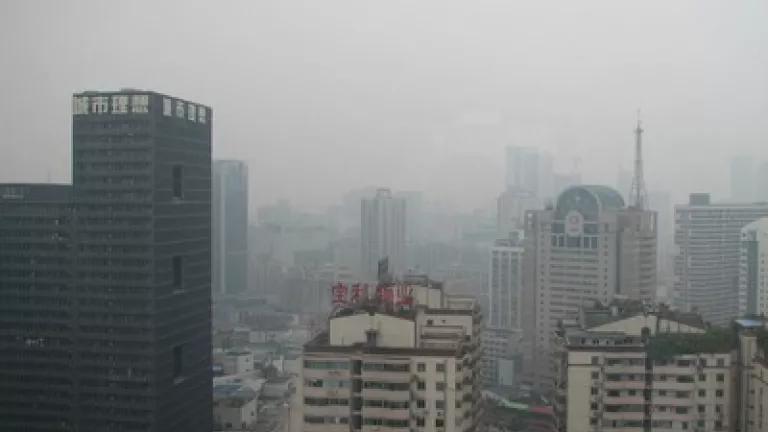
China's Clean Air Act was introduced in 1987, but it is not strongly enforced, and it doesn't regulate the fine particles which pose the greatest health risks. As a result, they have smog in almost all major cities, and many other areas, most of the time. Each city we visited during our 10-day stay was in a perpetual haze. In China they often refer to this haze as “fog,” and it has been there so long now that many think it is entirely natural; one intern in our office said he did not know it was pollution until he came to NRDC.
Here's what the sky looked like in Chengdu and Beijing:

Days without smog are celebrated as “blue sky days.” When people applauded what a clear day it was, my American colleagues and I looked at each other in disbelief - to us it seemed like yet another smoggy, hazy day.
Unlike the people of China, we in America are living with the benefits of a 40-year strong environmental movement. That law has saved hundreds of thousands of lives and billions of dollars. Because of the Clean Air Act, factories and power plants have installed controls to reduce smog and acid-rain-causing pollution. Cars today emit 95 percent fewer emissions than the cars of 40 years ago. The Clean Air Act has truly been one of the wonders of the world.
But even though many of our cities are largely free of the visible smog that plagues Chinese cities, pollution is still killing thousands of Americans every year: emissions from coal-fired power plants alone led to about 13,000 deaths in 2010.
As the House continues its ridiculous assault on our bedrock environmental laws - averaging one anti-environment vote every DAY this session - we risk forgetting the tremendous, positive change these laws have made and continue to make in America, saving hundreds of thousands of lives, and billions of dollars, all while spurring innovation and new opportunities for American business. For those who forget, I say: go to China. There are no pleasant walks to the office. No one goes for a run outside because the air is so bad. Sometimes, your lips taste like metal from the pollution.
In 2010, the Clean Air Act alone saved 200,000 American lives and prevented 18 million childhood respiratory illnesses, and complying with its safeguards has cost a fraction of what industry claimed it would. Its economic benefits, according to the EPA, outweigh its costs by 40 to 1. The acid rain program, for example, provides $80 billion a year in health benefits.
Safeguards like these have also generated new opportunities for business and are proven job creators. Clean air laws spurred American innovation that allowed domestic manufacturers to dominate new markets for catalytic converters and smokestack scrubbers. Reducing tailpipe emissions from cars produces $26 billion in domestic sales annually, and employs about 65,000 Americans. The entire clean tech industry generated 3.2 million jobs by 2002, and continues to grow despite the downturn.
When safeguards are introduced, innovation and jobs follow. No credible economist supports the Republican claim that pollution creates jobs, and that allowing dirtier air and water is a cure-all for our economic woes. If anything, their "too dirty to fail" jobs plan, as EPA Administrator Lisa Jackson calls it, will make us poorer and sicker.
In China, many businesses are fast realizing the advantages of cleaning up their act. They recognize that being clean attracts better workers and creates money-saving efficiencies. The companies that are smart enough to be clean are also the ones smart enough to be innovative.
Here at home, the big power plants and polluting industries that fight government safeguards are the dinosaurs. They are big and they are powerful, and they depend on the government to prop up their outdated business models. They rely on the government to protect their ability to pollute while we get hit with the tab for bronchitis, asthma attacks, sick kids, severe weather, and the other problems their pollution causes.
When the government stops picking up the tab for polluters, industries must find a way to pay for their pollution. Smart companies will innovate their way to success, while the "too dirty to fail" dinosaurs will continue the tactic of attacking health protections.
As I recall the haze that pervaded my trip to China, I can't help but think - there but for the Clean Air Act go us.